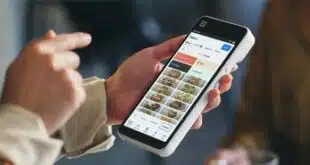Grocery-store giant The Kroger Co. is joining the ranks of retailers with a proprietary mobile-payments service, and adding a debit card to boot.
Cincinnati-based Kroger, which has 2,800 stores under numerous banners, last month unveiled Kroger Pay and its accompanying Kroger Rewards debit card. Kroger Pay, available for iOS and Android mobile devices, uses quick-response codes instead of the near-field communication contactless technology employed by general-purpose mobile-pay services such as Apple Pay and Google Pay, which Kroger does not accept.

The new program includes digital coupons and personalized offers. In Kroger’s case, the loyalty program also is tied to a new debit card, dubbed “Rewards.” Consumers accrue loyalty points when using Kroger Pay and can receive additional points when the payment method is the Rewards debit card or a general-purpose prepaid card that also carries a Kroger store brand.
Kroger Pay also works with other credit, debit, and prepaid cards. While Kroger Pay does not lock out general-purpose payment cards, it offers incentives to use its own card. Currently, Kroger Pay is available in Columbus, Ohio, with plans for nationwide expansion later this year.
Kroger Pay generates a one-time-use QR code in the app that sends payment information to the point-of-sale system via a scan. To use Kroger Pay at the checkout, the user opens the app in her smart phone and selects Kroger Pay from the “More” menu. She then either enters a PIN or scans a biometric. The QR code is scanned, followed by scans of items to purchase. At a self-checkout station, the consumer taps “Mobile Pay” on the POS system and follows the prompts.
Many merchants choose QR-code technology for their own mobile-pay services because it can be an easier integration into the checkout process, where consumers and employees are used to scanning, and it may enable some transactions to sidestep the payment networks.
For example, Target Corp.’s Wallet only works with Target’s debit card, credit card, or the Target Mastercard. The general-purpose mobile wallets, such as Apple Pay, Google Pay, and Samsung Pay, accept multiple payment types and work with multiple retailers if NFC technology is activated on their POS terminals. NFC is a wireless technology that some retailers have eschewed, but many others, including Target, have eventually adopted.
NFC also presents a better consumer experience, says Thad Peterson, senior analyst at Boston-based Aite Group LLC.
For example, to use Kroger Pay, the consumer has to find and open the Kroger app, then “find the QR code and present it,” Peterson tells Digital Transactions. “There’s more friction in their solution than there is using Apple Pay.” Apple Pay only requires the consumer to hold the iPhone or Apple Watch near the contactless reader to complete a transaction.
The question for the consumer then becomes, is there enough incentive in the loyalty program to use a QR code and overcome the purchase friction, Peterson says.
Kroger did not respond to a Digital Transactions request for comment. But the company has been more than willing to take high-profile stands on payment issues in the past. In 2016, it sued Visa Inc. over the routing of EMV debit card transactions. That suit is in settlement talks, according to recent court filings.
Last summer, Kroger’s Foods Co chain in California began boycotting Visa credit cards, citing high acceptance costs. Neither Visa nor Kroger would comment about the boycott, including whether it’s still on.




